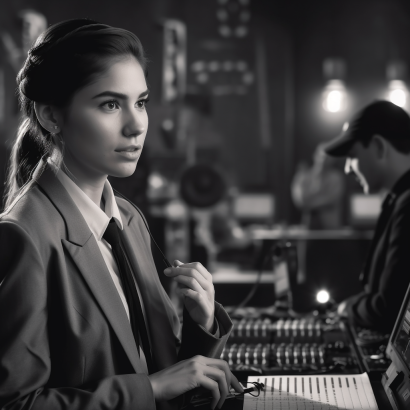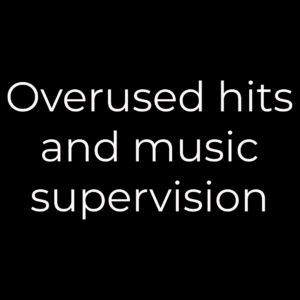Jobs in the sync music industry
What does “working in sync” mean?
Sync music involves various roles and jobs in the sync music industry, so it’s essential to identify which one you’re targeting. This will help you create a plan to ensure your objectives and actions lead to a clear result. Examples of roles include:
- Popular music songwriter
- Popular music artist
- Popular music producer
- Popular music composer
- Production music [all of the above]
- Music supervisor
- Sync license specialist
- Sync agent
- Publisher
- Record label
- Production library

Next, I’ll explain exactly what each of these people do in the sync music industry.
What is a songwriter in sync music?
In the sync music industry, a songwriter is someone who composes both lyrics and melodies to create songs. They specialise in crafting songs that evoke specific emotions, themes, scenes, scenarios, and situations.
Songwriters may be considered poets, but I have yet to encounter one who only writes lyrics. This suggests that lyrics alone are not enough to be a songwriter; if you are not interested in composing melodies, you may be better off pursuing a career as a poet.
If you only write lyrics, you need to collaborate with a melody-writer to succeed in pitching and placing your work in the music industry. Think of Bernie Taupin and Elton John, who worked together as a duo. Therefore, I suggest finding someone to work with as a team, rather than searching for different melodies for each lyric you write.
Alternatively, if you create amazing melodies but not lyrics, you are likely a music producer or composer, rather than a songwriter. It’s best to find collaborators who can write better lyrics.
Knowing your strengths in words and music will help you determine the best career path and identify who to collaborate with to ensure your talents are not wasted due to a lack of proficiency in the other.
What is an artist in sync music?
Traditionally, the artist was a talented singer and performer who took the stage to perform songs. They often weren’t the songwriters, but their vocal and stage presence was enough to be revered.
In the 1960s, the music industry began to shift: prior to that, artists and songwriters had been distinct entities.
In today’s sync music industry, it is clear that the only way to have a successful career is to be an established artist with both live and recorded music, or to be a songwriter.
What is a music producer in sync music?
A music producer is responsible for transforming a songwriter’s work into a full-fledged record production, complete with all the accompanying instrumental and textural elements.
Music producers are responsible for creating tracks, which are the musical foundations for other elements. In the recorded music industry, this is usually vocals layered on top of the track. However, in sync, the track can also provide a backdrop for dialogue or soundscapes, such as a rainy night in the city, or the sound of water splashing in a bathtub with someone crying surrounded by candles.
In the sync music industry, a music producer is often referred to as a composer. This depends on the type of project they are working on; for instance, when creating scores or soundtracks, they are usually referred to as a composer, whereas when working with vocalists, they are more likely to be called a music producer.

What is a composer in sync music?
A composer is responsible for creating the music for a video production. Sometimes, a different composer will write a soundtrack – a more musical, holistic, and coherent melody-focused representation of the project’s theme – than those who compose the score, which guides the emotions, suspense, and ambience during the production. The soundtrack is more focused on melody, while the score is designed to evoke specific emotions and create atmosphere.
Knowing the terms source and score can help understand why someone might be referred to as either a music producer or composer. Unlike score, which guides the feeling and isn’t heard by the actors/part of the story, source music is heard in the story/by the characters/actors and is more likely to be “commercial” music that would have been “produced”.
I’ll include arrangers in this section too. While composers oversee the full instrumentation and musical score, arrangers typically rewrite sections of music for a specific orchestral section.
What is the difference between a music producer and composer in sync music?
Most music producers and composers are skilled in music composition. In sync music, they often take on both roles, though they may use different titles depending on the project.
For example, in production music, the person responsible for both composing and producing the record is typically referred to as a composer.
What is a music supervisor?
A Music Supervisor is a professional who works to match music with visual media, such as films, television shows, commercials, and video games. Their role is to find the best musical fit for a particular project and ensure the correct licenses and fees are obtained for its use.
To do this, Music Supervisors often collaborate with composers, songwriters, producers, and record labels. They also negotiate with artists, labels, and publishers to obtain the necessary rights and permissions.
Music Supervisors must be knowledgeable about the music industry and have a keen ear for what will work with a visual project.
What is a sync license specialist?
A Sync License Specialist is a professional with expertise in obtaining the necessary licenses to use music for synchronisation in a variety of media.
They specialise in dealing with copyright and licensing issues and are responsible for ensuring that the rights and permissions for using any given piece of music are in order.
This involves understanding the different types of licenses and being aware of the intricacies of royalties, music rights, and other legal matters.
They also negotiate with artists, labels, and publishers to obtain the necessary clearances.
Sync License Specialists work closely with Music Supervisors to ensure the correct licenses and fees are obtained for the use of music in a production.
Music Licensing Specialists may also go by other titles, such as Music Licensing Lead, Music Clearance Specialist, or Music Licensing Coordinator. These professionals may have legal experience at the highest levels.

What is a sync agent?
A Sync Agent is a professional who works with Music Supervisors and Sync License Specialists to provide music for synchronisation. They are responsible for finding the best music for a specific project and negotiating with labels and publishers to obtain the necessary rights and permissions.
A Sync Agent can also be a music supervisor or sync license specialist with a broad knowledge of the music industry. They have a keen ear for what will work with a visual project and the experience to identify the best music for a project.
Sync Agents often collaborate with composers, songwriters, producers, and record labels to ensure that the rights and permissions for the use of any given piece of music are in order. They are also knowledgeable of the different types of licenses and aware of the intricacies of royalties, music rights, and other legal matters.
In addition, Sync Agents may also be responsible for negotiating with artists, labels, and publishers to obtain the necessary clearances and licenses.
What is a music publisher?
A Music Publisher is responsible for protecting and administering the rights of music creators. They collect and distribute royalties, negotiate licenses, and represent the interests of their clients to ensure they are properly compensated for their works.
Music Publishers also promote their clients’ music, ensuring that their works are heard by the right people, and helping them to gain recognition and further their careers. They often negotiate deals with labels, television and film producers, and other music industry professionals.
Music Publishers also serve as a liaison between songwriters, composers, and other music industry professionals. They help to develop relationships between their clients and the people and organizations that need their music.
Music Publishers can be a valuable asset to songwriters and composers, as they provide the necessary guidance, advice, and support to ensure their clients are properly compensated for their works.
What is a record label?
A Record Label is a company that is responsible for producing, distributing, marketing, and licensing music. They typically invest in new music and sign up artists and songwriters to produce music that will be released and marketed to the public.
In the sync music industry, record labels collaborate with Music Supervisors and Sync Agents to supply music for synchronisation projects. They are tasked with finding the most suitable music for a given project, recording songs that meet the brief, obtaining the necessary rights and permissions, and ensuring that their artists and songwriters are adequately compensated.
Record labels are also responsible for promoting their artists and songwriters, ensuring that their works are heard by the right people and helping them to gain recognition and further their careers. They often negotiate deals with television and film producers, Music Supervisors, and other music industry professionals.
What is a music production library?
A Music Production Library is a collection of pre-recorded music created specifically for use in synchronisation projects, such as film and television. These libraries typically contain instrumental tracks, sound effects, and pre-recorded vocal performances.
Music Production Libraries are maintained by companies that specialise in creating sync-ready music. They offer a wide variety of tracks, ranging from traditional pop and rock to more eclectic and experimental pieces. The music is usually produced with a “sync-style” approach, meaning that it has a tight timing, specific musical elements, and an overall sound that fits well with various media projects.

In the past 10 years or so, many artists have been creating “sync-ready” music, which is similar to what music production libraries offer but with an additional “artist brand” element. However, this isn’t always advantageous, as production library music is usually cheaper to license than commercial music. Consequently, more successful artists entering this space are driving down sync fees across the industry.
As an artist, it is essential to consider if your artistic integrity and value are compatible with the market you are competing in. Not all music is suitable for sync, and altering your music to meet its requirements may compromise the art itself.
Music Production Libraries are a valuable asset in the sync music industry. They offer a wide selection of music that can be accessed quickly and easily. Moreover, they are regularly updated, making them an ideal resource for Music Supervisors and Sync Agents who need to find music quickly and efficiently. Therefore, it is worthwhile to create music and collaborate with these partners, even if it is not your primary focus.
What is the difference between a record label and production library?
The main difference between a record label and a production library is the type of music they offer. Record labels typically invest in and sign up artists and songwriters to produce music that will be released and marketed to the public. On the other hand, production libraries contain pre-recorded music created specifically for use in synchronisation projects such as film and television. They typically contain instrumental tracks, sound effects, and pre-recorded vocal performances that are produced with a sync-style approach, meaning that they have a tight timing, specific musical elements, and an overall sound that fits well with various media projects. In addition, production library music is usually cheaper to license than commercial music.
Blog posts about sync
Understanding music industry market share: a guide for independent artists, labels, and music tech startups
What is the music industry market share? Market share in...
Read MoreWhy is compiling an old familiar soundtrack in sync and music supervision considered such a good thing?
Something that always really annoys me in sync (but, admittedly,...
Read More
